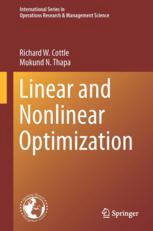

Most ebook files are in PDF format, so you can easily read them using various software such as Foxit Reader or directly on the Google Chrome browser.
Some ebook files are released by publishers in other formats such as .awz, .mobi, .epub, .fb2, etc. You may need to install specific software to read these formats on mobile/PC, such as Calibre.
Please read the tutorial at this link: https://ebookbell.com/faq
We offer FREE conversion to the popular formats you request; however, this may take some time. Therefore, right after payment, please email us, and we will try to provide the service as quickly as possible.
For some exceptional file formats or broken links (if any), please refrain from opening any disputes. Instead, email us first, and we will try to assist within a maximum of 6 hours.
EbookBell Team

4.3
38 reviewsThis textbook on Linear and Nonlinear Optimization is intended for graduate and advanced undergraduate students in operations research and related fields. It is both literate and mathematically strong, yet requires no prior course in optimization. As suggested by its title, the book is divided into two parts covering in their individual chapters LP Models and Applications; Linear Equations and Inequalities; The Simplex Algorithm; Simplex Algorithm Continued; Duality and the Dual Simplex Algorithm; Postoptimality Analyses; Computational Considerations; Nonlinear (NLP) Models and Applications; Unconstrained Optimization; Descent Methods; Optimality Conditions; Problems with Linear Constraints; Problems with Nonlinear Constraints; Interior-Point Methods; and an Appendix covering Mathematical Concepts. Each chapter ends with a set of exercises.
The book is based on lecture notes the authors have used in numerous optimization courses the authors have taught at Stanford University. It emphasizes modeling and numerical algorithms for optimization with continuous (not integer) variables. The discussion presents the underlying theory without always focusing on formal mathematical proofs (which can be found in cited references). Another feature of this book is its inclusion of cultural and historical matters, most often appearing among the footnotes.
Michael P. Friedlander,
IBM Professor of Computer Science,
Professor of Mathematics,
University of British Columbia